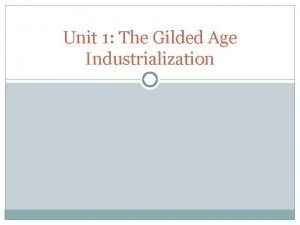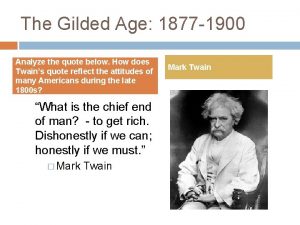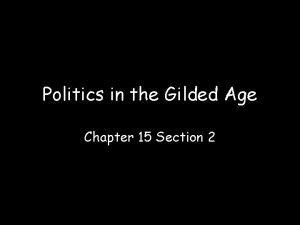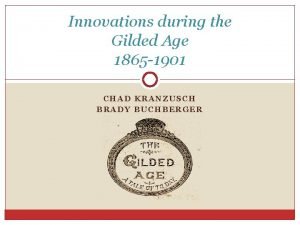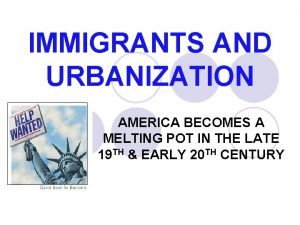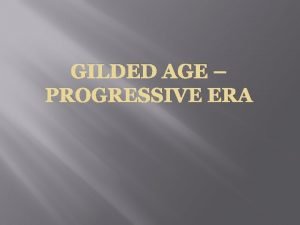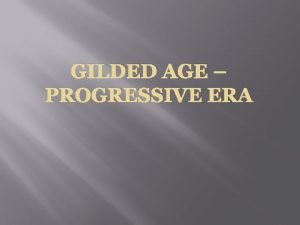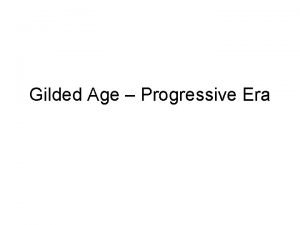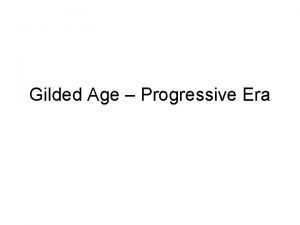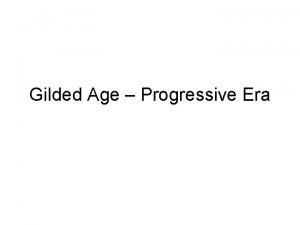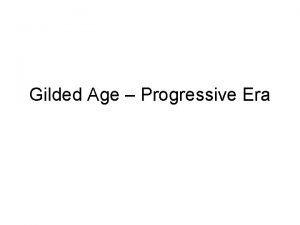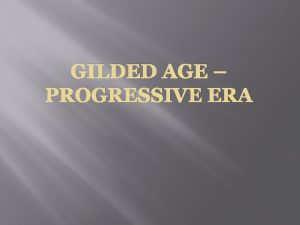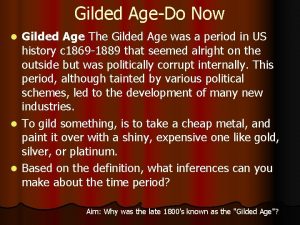APUSH REVIEW THE GILDED AGE Shoutout Mr Longies













- Slides: 13

APUSH REVIEW: THE GILDED AGE Shoutout Mr. Longie’s Everything You Need. Time! To Know About The Gilded Class and their class pet Age To Succeed In APUSH Adam Norrfish, Mr. Mayer’s Class in Washington, and Mrs. Johnson’s Class at Pikesville High. School! Best of luck!

The Gilded Age: A Brief Intro • Coined by Mark Twain • Societal problems were masked by a thin layer of gold • From 1870 - 1900 • Period of technological progress and economic growth

Politics & Economics During The Gilded Age • Republicans and Democrats were split over economic issues: • Tariffs - Republicans advocated higher tariffs, Democrats advocated lower tariffs • Currency: • Republicans favored gold standard • Democrats (1896) advocated Free Silver (backing up the value of the $ with silver) • This would favor farmers and those in debt • Growing gap between rich and poor

Politics & Economics During The Gilded Age • Political Machines • Political organizations that provided jobs and services to constituents and received support in return • Tammany Hall in NYC • Boss Tweed - dishonest graft

Technological Advancements During The Gilded Age • Scientific Management Frederick Taylor, “Taylorism”: • Focused on improving efficiency of workers - timed tasks • Workers were given specific tasks • Mechanized tractors, grain elevators • Bessemer Process - mass produced steel

Business Consolidation During The Gilded Age • Trusts - associated with monopolies • Holding Companies - one company that owns stock in many others and controls them • Vertical Integration - owning all aspects of production of a business (start to finish) • Horizontal Integration - businesses in an industry join together and form a monopoly

Unions During The Gilded Age • Emerged as a response to working conditions and wages • Knights of Labor: • Skilled and unskilled workers • American Federation of Labor: • Skilled workers - focused on “bread and butter” issues

Strikes During The Gilded Age • Strikes were often a reaction to wage cuts • Railroad Strike of 1877: • Broken up by federal troops (Hayes) • Haymarket Square Riot (1886): • Protest in Chicago that turned violent when someone threw a bomb • Unions were blamed • Homestead Strike: • Carnegie steel plant • Pullman Strike: • Company cut wages, did not cut rent prices in town

Farmers During The Gilded Age • Populist Party • Response to growth of corporate power (RRs) and economic instability • Wanted the government to have a stronger role in the economy • Advocated: • Graduated income tax, “free silver”, direct election of senators

Key Terms • Social Darwinism: • “Survival of the fittest” applied to businesses • Used to justify the success of businesses and the wealthy • Gospel of Wealth: (Andrew Carnegie) • Advocated for wealthy individuals to give back to society (philanthropy) • Examples: Vanderbilt University, Carnegie gave $ for libraries

• Social Gospel: Key Terms • Protestant Church movement to improve society - created reading rooms, nurseries, and other services for needy • Interstate Commerce Act (1887): • Allowed the government to investigate RRs, mostly symbolic at first • Sherman Anti-Trust Act (1890): • Federal government could investigate trusts, strengthened in

Test Tips • Multiple-Choice and Short Answer: • Reasons for the creation and impacts of: • Unions, consolidation of businesses, and Populist Party • Differences between Republicans and Democrats (Currency and Tariffs) • Essays and DBQs: • Impact of technology on workers/businesses

Thanks For Watching! • Best of luck in May!
 Taylorism apush
Taylorism apush Wilson gorman tariff apush
Wilson gorman tariff apush Who helped build the transcontinental railroad
Who helped build the transcontinental railroad Gilded age eoc blitz review
Gilded age eoc blitz review Iron age dates
Iron age dates Iron age bronze age stone age timeline
Iron age bronze age stone age timeline Standard oil monopoly
Standard oil monopoly The gilded age vocabulary
The gilded age vocabulary Mark twain gilded age quotes
Mark twain gilded age quotes Gilded age time period
Gilded age time period Chapter 15 section 3 politics in the gilded age
Chapter 15 section 3 politics in the gilded age Inventions during the gilded age
Inventions during the gilded age The gilded age medvirkende
The gilded age medvirkende Melting pot gilded age
Melting pot gilded age






